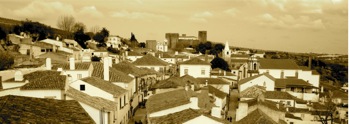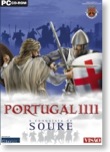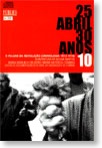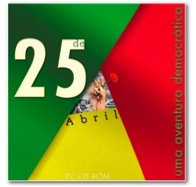Resarch Projects
MATER: (Modelos de Auto-organização Territorial /
Models of Self-Organization of Territories)
This is a project to create computer models capable
of reproducing the self-organizational patterns that is
detected in the size of settlements, a phenomenon usually
called the
Zipf law of cities. The output of the
models will be tested against available data from
historical population distributions.
The project is financed by the Institute of
Interdisciplinary Research (III) of the University of
Coimbra, an institution dedicated to the promotion of
interdisciplinary research at the University of Coimbra.
We are a team of 8 including
computer scientists, historians and archaeologists that I
have the privilege to be coordinating.
CLIOHRES.net Thematic Work Group 3 "Religious and
Philosophical concepts".
 CLIOHRES.net
CLIOHRES.net is a Network of Excellence
in the 6FP, headed by the Universities of Pisa and
Reijkiavik.
I am the leader of one of the six thematic work
groups, dedicated to
Religious and Philosophical
Concepts. Our team has 25 people from
9 different countries and we produced two volumes with
our work available in print form and online
[vol1] [
vol2].
Extension projects
These are projects
commissioned by external entities and therefore funded as
external services. They do not use public funding directly.
ARQÓbidos.
Óbidos is wonderfull, beautifully preserved medieval
town in the centre of Portugal that is investing heavily in
the study of its own past, as part of the long term aim of
becoming a UNESCO World Heritage site. The History Group of
the University of Coimbra was commissioned to create a
database with information from parish registers and
notarial records of the 17th to 19th centuries. I am
coordinating this project with my colleague Saúl Gomes. Ana
Isabel Ribeiro, also from the History Group of the
University of Coimbra, joined us to help supervise the two
research graduates (Yann Araújo and Isabel Rodrigues) that
are doing the hard work at the archives.
Previous projects

MontemorINPACT.
Montemor-o-Velho is an historical
town 20 km from Coimbra towards the sea. The city council
obtained European funding to elaborate a study on the
feasibility of creating a Industrial Park for Cultural
Activities. The University of Coimbra was commissioned
important sections of the study, including an analysis of
potential demand and desirable facilities and services
associated with such a park. We also have to design a
management structure for the future Park. My role is to
coordinate a team that includes my colleagues João Luís
Fernandes, form the Institute of Geographical Studies,
Lurdes Craveiro from The Institute of Art History and
Conceição Lopes from the Institute of Arqueology. We also
have in our team Jorge Figueira from the Office for
Knowledge Transfer of the UC and a team of students working
part-time. Other parts of the study are being done by
consultants and other higher education institutions. This
project anticipated many of the findings in the recent
report on the Economy of Culture in Europe, prepared for
the European Commission (Directorate-General for Education
and Culture), in special the role of Culture in local
economic development in a globalized world. The results
were presented to the public in April 2008. You can here
get the
flyer and the
executive report (in Portuguese).
This is not the end of the INPACT. In the next months the
implementation of the report's recommendation will begin.
Hopefully.
http://www.uc.pt/ects/ The ECTS information guide at
the University of Coimbra
As part of the strategy of
the University of Coimbra, aimed at improving significantly
the quality of practices related to student mobility, I was
asked by the Vice-Rector Cristina Robalo Cordeiro, together
with Filomena Marques de Carvalho, head of the Division for
International Relations, Image and Communications, to
coordinate the design and implementation of the UC's ECTS
information package on-line.
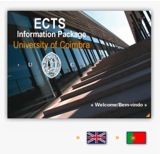
We were fortunate to have Rita Maia as our assistant
in this process, which includes outside contractors for the
software (Teleformar and Flor de Utopia) and internal
coordination with people involved in the different
information systems that manage parts of the data we need,
and all the ECTS departmental coordinators. My task was to
steer the design of the database structure and web
interface and recently to find ways to raise the quality of
information flow inside the UC (e.g.promoting the emergence
of standards and authority sources for data interchange of
academic information). The ECTS information package had
10.000.000 hits in the first year, becoming the most
popular section of the UC main site, displacing the CD25A
page, another project I was involved with. In 2007 the UC
decided to integrate the ECTS information package into a
new Academic Information system and the system I was
directly involved with is being phased out but the look,
structure and overall design is being kept in the new
version, as far as possible.
Portugal 1111: a conquista de Soure, is a
computer game produced by
Ciberbit, with the support of the city
of Soure, that sold almost 25.000 copies in a few
weeks.
I was responsible for management the production of
the content, that is the historical background, the model
that regulated the interaction of all the aspects
(economic, commercial, military, religious) and
coordinating the work of military history experts,
musicians, artists, etc... I also did the level design (map
construction and difficulty tuning) and gave my voice to
one of the units. My wife did the voice of the obedient
peasant girls. The game has a web page at
http://www.portugal1111.com. One of
the surprising outcomes of this project was
experiencing "live" the huge amount of interest in
History existing out there, that expressed itself in
hundreds of messages in the game forum and elsewhere.
Check
my own page on the Portugal 1111
project.
O pulsar da revolução
This was a remake, sort of, of "25 de Abril uma
Aventura democrática", made for the 30th aniversary of the
1974 revolution. It was an initiative of the portuguese
daily Publico. This time it was integrated in a collection
of CDs with music, video and othe rmaterials, that come out
weekly. The product was targeted to a more adult audience,
and constituted a portable mini-archive of the revolution,
with video, documents, radio transmissions, etc... and a
minute by minute chronology of the events, that had been
published before in book form.
25 de Abril uma Aventura Democrática:
(25th April, a democratic adventure) is a
multimedia CD-ROM produced by the
25th April Centre of Documentation (CD25A), an archive
specialized on the portuguese democratic transition with a
rich collection of personal archives.of some of the
relevant people of the "carnations revolution". I
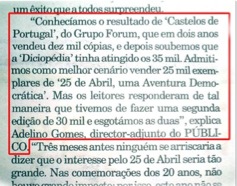
coordinated
the production with Nuno Gouveia of Ciberbit ( software
development) and Natércia Coimbra, of the CD25A
coordinating source selection. The CD-ROM was sponsored by
the Office of Youth in Portugal (Secretaria de Estado da
Juventude) in 1999, for the 25th anniversary of the 1974
revolution. The head of the Office saw the CD25A site on
the Internet (see bellow) and decided to have a CD-ROM
version to distribute in schools and to the general public
through a major newspaper. It went to the news-stands in
the 25th April 1999 and sold out in a few hours (I could
not get one myself). A reprint was done for the next week,
and sold-out again. In two weeks over 60.000 copies were
sold, my most relevant project so far. The names of all the
students that had worked in the original internet site
where in the CD-ROM. Lessons learned: in a market oriented
project not linking your fee to the success of the final
product is a pretty dumb idea; History sells; check
carefully if everyone that gives you the right of
reproducing materials actually owns those rights..
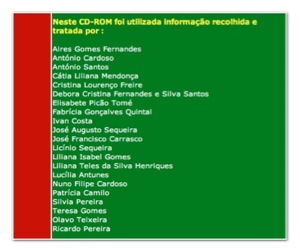

http://www.uc.pt/cd25a The web site of the
25th April Centre of Documentation (CD25A), an archive
specialized on the portuguese democratic transition with a
rich collection of personal archives.of some of the
relevant people of the "carnations revolution". This was my
first experience of the potential of giving history
students the competences, tools and environment for
creating content for the Internet. That was 10 years ago
and the first component was
an electronic version of the chronology
of the portuguese democratic transition.
The pioneer students were António Cardoso, Ivan Costa,
Licínio Sequeira, Patricia Camilo, Silvia Pereira e Teresa
Gomes, back in 1996. From this work two CDs com out, my
first real life projects in market oriented multimedia.
Lessons learned: Give students a project like environment,
with token contracts, division of labour, leadership roles
and public exposure of the final product.




